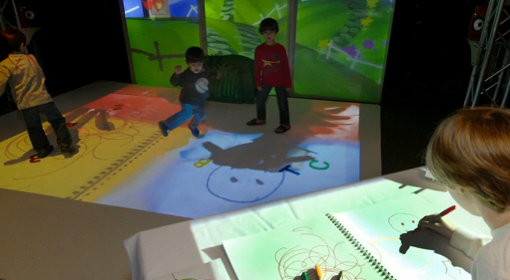Cynthia Breazeal founded the Personal Robots Group at MIT’s Media Lab. Her research focuses on socially intelligent robots.
Earlier this year Breazeal presented the Rise of Personal Robots [TED talk video].
Her central idea was that robots equal social technology. She believes robots embody a form and level of interactivity that can engage humans in a uniquely human manner — not only as utilitarian servants.
 Playtime Computing: shared play media space
Playtime Computing: shared play media space
In her talk Breazeal puts forward many examples of robots as social technology. Two relate specifically to play.
In the first scenario [6:55 in the video], Breazeal introduces robots as a distance play technology. Specifically, she paints the picture of her young boys playing across long distances with their grandparents (“Grandma-bot”). Interestingly, she makes no mention of playing games or introducing her boys and her mother to online virtual gaming spaces. Rather, she envisions free play together with toys as well as storytelling and fantasy play.
In the second scenario [10:55 in the video], Breazeal talks about her vision for the future of children’s media. She’s primarily motivated to move kids away from only consuming media from screens and developing “playtime computing.” This type of computing is very spatially involved and utilizes telepresence and mixed reality. She speaks of kids building their imaginations and projecting ideas into a shared space where other kids can interact and build upon those ideas. She believes all this will develop creativity and innovation and foster learning. I love it. I hope someday soon to bring something together that similarly engages adults in shared spaces albeit in slightly different contexts.
Take the time to watch the TED Talk video to see the really cool projects Breazeal and her students are building in the lab.
(See also context-aware toys I wrote about some time ago.)